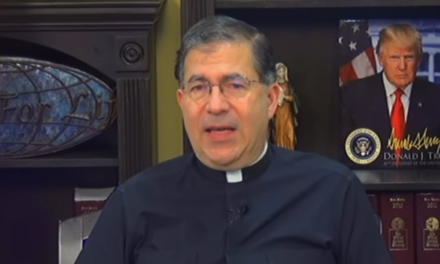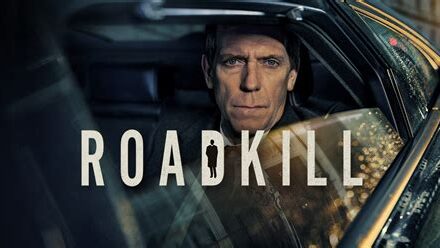Here we are, in the midst of a presidential election pitting an avowed abortion advocate against an avowed pro-life candidate. Making the choice between them more stark, Hillary Clinton has chosen a pro-abortion Catholic, Sen. Tim Kaine, while Donald Trump picked pro-life Gov. Mike Pence.
To make matters even more stark, Hillary Clinton has made the support of Planned Parenthood, the proven seller of infant body parts, part of her political platform, while the platform of her Democratic Party has announced a more extreme pro-abortion clause than in previous elections. Donald Trump, on the other hand, has promised to sign a bill defunding Planned Parenthood and has published a list of potential Supreme Court nominees all in the mold of the late Justice Antonin Scalia.
What do we hear from the leadership of the Catholic Church in the United States? There has been one helpful blip, that I know of, on the bishop’s radar:
Bishop Tobin of Providence, RI, in a post on Facebook asked aloud, if Tim Kaine was a Catholic?, and concluded that Kaine’s support for abortion, among other things, “are clearly contrary to well-established Catholic teachings . . . . apparently, and unfortunately, his faith isn’t central to his public, political life.”
On the other hand one bishop who has supported pro-life causes for his entire career has written a strange and surprising column. Philadelphia’s Archbishop Chaput wrote on the Archdiocesan website, “Some personal thoughts on the months ahead.” He writes that between, “both major candidates . . . that neither is clearly better than the other.” The reasons given by the Archbishop begin with the income of the candidates, both are multi-millionaires, and he argues:
“The median U.S. income is about $56,000. Neither major candidate lives anywhere near the solar system of where most Americans live, work, and raise families. Nonetheless, we are asked to trust them.”
I wonder what the multi-millionaire donors to the Archdiocese of Philadelphia feel about that?
The Archbishop’s next argument cites the “defective ethics, “buffoonery,” and “bombast” that “make him [Trump] inconceivable as president.” Really? The only pro-life candidate is “inconceivable” as President?
Let’s turn to what the Archbishop says about the pro-abortion Hillary Clinton: “in the view of a lot of people – [Clinton] should be under criminal indictment. The fact that she’s not – again, in the view of a lot of people — proves Orwell’s Animal Farm principle that ‘all animals are equal, but some are more equal than others.'” Fair enough, but there’s no mention of her being “inconceivable” as president.
For Archbishop Chaput, Clinton is conceivable and Trump is not. Thus, I wrote the headline above: The Catholic Church Doesn’t Care About Abortion.” But there is more.
Archbishop Chaput, a man I have greatly respected for many years, goes on to remind Catholics that God does not prefer one political party over another, “But God, by his nature, is always concerned with good and evil and the choices we make between the two.” Yet, the Archbishop himself began his critique of the candidates with the the amount of their personal wealth, followed by a listing of their personal flaws, finding the flaws of only one candidate made him “inconceivable” as President, but makes no mention of the evil of abortion.
Next, the Archbishop reminds Catholics that not “all pressing issues [are] equal in foundational importance or gravity. The right to life undergirds all other rights and all genuine social progress.” Why did he make no mention of the issue of “foundational importance” in relation to the candidates or their running mates? If the abortion issue possesses so much moral “gravity” why are the candidates not evaluated in that light?
Rather than informing Catholics on where the Clinton/Kaine ticket stands on abortion, the Archbishop warns Catholics against the “mobocracy” of social media and advises clarity of thought and prayer, as well as reading the bishop’s own “Forming Consciences for Faithful Citizenship,” and their 1998 Pastoral Letter, “Living the Gospel of Life.” Well, OK, let’s read it. Here is what the bishops wrote in 1998:
Every vote counts. Every act of responsible citizenship is an exercise of significant individual power. We must exercise that power in ways that defend human life, especially those of God’s children who are unborn, disabled or otherwise vulnerable. (Paragraph 33; Emphasis added)
This is not what I read in Archbishop Chaput’s “personal thoughts.” Perhaps no bishop of the present generation has supported the pro-life cause more consistently and ably than the Archbishop of Philadelphia. Why not mention here? It’s not as if the position of either candidate is a secret. In the case of Hillary Clinton, her passionate support of abortion-on-demand is both a matter of public record and expressed conviction. What we have from Donald Trump are promises, since he has never held public office, but they are convictions that go back years before this election campaign.
As someone who has worked in five presidential elections, trying to convince Catholics to vote for pro-life candidates, I have experienced the resistance, and outright hostility, of Catholic bishops, priests, and other leadership to the pro-life political message. I’ve shared the essentials of that experience and predicted it would be multiplied exponentially in this election, which it has.
I will offer one, very telling, example. I’ve been tracking the various conferences being offered by dioceses around the country before the election, such as the 2016 State Respect Life Conference to be held October 14-15, 2016 at Sts Peter and Paul Catholic Church in Winter Park, Florida. This event is being hosted by the Diocese of Orlando’s Office of Advocacy and Justice. In addition to this, the Office of Advocacy and Justice will be hosting “Faithful Citizenship Workshops” in other parishes. The Office makes use of “Candidate Forums” and offers a link to the USCCB website, “Tips For Conducting Candidate Forums.” Click on this link and you will find the following advice:
Cover a broad range of issues: Focusing on one issue will create the appearance of endorsing some candidates over others. A broader focus will more effectively educate voters and will avoid any appearance of bias.
The USCCB is arguing that those who focus on abortion, the “one issue,” will appear to be “endorsing some candidates over another.” Really? What is the practical consequence of this “tip”? It means that any person or group that focuses on the abortion issue of political candidates and parties is to be considered as partisan, that is, endorsing a candidate. As a consequence, Catholic pro-life advocates cannot be included in forums and conferences sponsored by Catholic organizations such as the “Office of Advocacy and Justice,” and most other Catholic organizations whose social justice convictions don’t include the protection of innocent life.
I wonder if the same rule would apply to a group whose mission was to support candidates who want open borders that will “welcome the stranger” and conferring of U.S. citizenship on illegal immigrants? Doubtful.
Pro-life Catholics need to wake up and realize that most of the “officialdom” of the Catholic Church in the U.S. is already rolling out a national campaign that is virtually an arm of the Democratic Party. If you don’t believe me, start tracking the various conferences and forums being offered in your diocese, drill down to look at the host organization, the speakers, and their topics. Better yet, attend one and publicly voice your pro-life preferences and see what happens.
I do not include Archbishop Chaput in this at all. But his “personal thoughts” do nothing to give second thoughts to those Catholics who are part of this rollout, whereas reading his 2009 book, Render Unto Caesar: Serving the Nation by Living Our Catholic Beliefs in Political Life, just might.
“When Catholics oppose abortion, they do so not because of some special Catholic religious doctrine or simply because the church says so. Rather, the church teaches abortion is wrong because it already is. Abortion violates the universal natural law by abusing the inherent human rights of the unborn child. The injustice of genocide, oppressing the poor, the killing unborn children is not a matter of religious doctrine. It’s a matter of natural law” (p.83).















Deal, your most important missive that you have done. Let me state this categorically, we have abortion on demand in this country because of the lack of courage of the Bishops. The Bishops are a feckless bunch who are ineffective and cowardly. The lay people are keeping the pro-life movement afloat and vibrant without any assistance from our leaders or the chancery personnel they employ and hire. This is a scandal. The Holy father has a part in this because he has taken the legs out from pro-lifers with his comments about the Church focusing too much on the issue. Since when has this occurred??? Prayers are needed for him and the Bishops to get some much needed courage.
Well said Jason……100% right.
Jason – right on the money. And money is what seems to matter most to the American Church hierarchy. Too bad. Their focus should be the Truth. Because there can’t be justice if there isn’t Truth.
Unfortunately, the reason is more insidious than that. Most bishops and priests fancy themselves as liberals (a.k.a., socialists) and are willing to sacrifice the little ones at the alter of ba’al in favor of making everyone materially equal through the (forced) redistribution of wealth (a.k.a, theft). There are many more intrinsic evils that they ignore in pursuit of material equality, like contraception, sterilization, sodomy, no fault divorce, abstinence plus sex ed, pornography, IVF, embryonic stem cell research, euthanasia, and the selling of baby body parts. All of these evils are attacks on human life and the family. But the most evil act is the attempt to replace God with our government. Jesus says, “If you love me you will keep my commandments.” Pray for our priests.
Completely agree.
So, the gist of this article is that a few comments by a handful of church officials proves that the entire Catholic Church “doesn’t really care about abortion” and is implicitly supporting the Democratic Party . I remember learning about the logical fallacy of “hasty generalization” in one of the philosophy classes I took in college. It’s quite disappointing that someone with a Ph.D. at the end of their name would succumb to such faulty reasoning.
No, Michael not at all. The gist is that if the Church truly cared as it’s doctrine teaches, there would be an outcry when a politician poses as a Catholic who “personally supports abortion.” You cannot be in good standing and support, vote or endorse any abortion candidate. You have it backwards, only a handful meagerly are speaking out not the opposite.
Exactly, Claire Smith. We have not had opposition to abortion, euthanasia, embryonic stem cell research, contraception, IVF and many other real life or death issues from the pulpit for years, except a very few. It’s their Bishops who set the tone. I haven’t seen it in their writings either. I feel like the Canadian citizens must have felt back when their Bishops openly defied the Pope in opposing his call against contraception. Heartbroken!
I had the same thoughts when I read the good Archbishop’s article. It truly boggles my mind that many of my parishioners who are active in the Church, including serving as Extraordinary Ministers of Holy Communion and Ministers to the Homebound have absolutely no qualms about voting for the Democrat party. You absolutely cannot talk to them. They are rigid and intolerant. It makes me very sad.
There are daily communicants in parishes everywhere who have cast every vote in their lifetime for the pro-abortion candidate.
They don’t seem aware, they are trying to do the ‘socially’ right thing. Why, Fr. Vincent, are they not aware? We need courageous leaders, there is too many confused people. Who cares if they no longer donate, or if we lose tax exemption. People who vote for abortion candidates has blood on their hands.
Chaput is one of the many hirelings seeking to protect that which is truly sacred……501(c)(3) status.
I have met with so many attorneys regarding this. This threat is a scare tactic. Look up the cases of statuses that have been revoked? NONE. The priests, bishops and clergy need to hammer this home from the ambo, “abortion carries the most gravitas of any social justice!” This is one of our church’s settled matters!
Remember too that they don’t want to offend those in the pews……it’s all about $$$ however you slice it. Great article by Deal, btw.
You must not have followed the man throughout his life as a priest. His political candor caused me to ask my husband, “can a bishop say that?” at a conference he keynoted. Just because he’s not beating your particular political drum doesn’t mean he’s a sellout. Please don’t make rash statements. Some of us are not convicted in support of either major candidate. Also, please read the good archbishop’s own words – in their entirety – instead of cut and paste ‘reporting’ from various pieces.
And some of you can sit around being judgy and let Hillary appoint pro death judges. That’s a fact.
As Catholics, our Faith is not primarily in the Church hierarchy, but in Jesus Christ, and Love for Him and for His Teachings. We have certain Hope, if we follow Jesus! Let us remember the closing words words of the Letter from St. Athanasius, “Even if Catholics faithful to Tradition are reduced to a handful, they are the ones who are the true Church of Jesus Christ.”
I’m afraid if the archbishop doesn’t toe the francisgospel party line of mammon-equality, (above everything else) he’s sidelined in a New York minute!
SEQUI PECUNIAM!
Calling candidate Trump an avowed pro-life candidate goes a bit far, as does the problematic representation of what Archbishop Chaput said. In no way is he suggesting that a vote for Hillary Clinton would be morally acceptable to his flock. What he is saying is correct – both candidates have ‘astonishing flaws’. The hesitancy that many Catholics (and other Christians) feel toward voting for Trump is genuine. Lest we forget the Donald that we have gotten to know over the past decades of his very public life, let us be honest when discussing his newfound, convenient and unproven conversion.
In agreement with Archbishop Chaput, I have also found this to be an election cycle that is”liberating, because for the honest voter, it’s much easier this year to ignore the routine tribal loyalty chants of both the Democratic and Republican camps”. As we turn to Jesus and Our Lady in the Rosary Novena for Our Nation, let us remember that we are citizens, not of this world but of the World to come.
Holding of the nose and voting for the one ‘who does less harm’ aka ‘the lesser of two evils’ has become incrementally more difficult with each election cycle – Bush, McCain, and Romney. Many of us have finally found the intestinal fortitude to say ‘enough’. While my heart is heavy, given the choices the American people have been given by the two major political parties, my soul feels relieved and rejuvenated. Words attributed to Blessed Teresa of Calcutta are eminently applicable to this devastating presidential election, “We’re not called to be successful; we’re called to be faithful,”.
There are many misgivings on the part of Christians with fully formed consciences. We have done our research (both Catholic and civil), prayed mightily, and discerned accordingly. The vitriol thrown our way is far from deserved.
I leave you with some thoughts about this election: http://www.catholicstand.com/10-reasons-can-not-vote-trump/
Birget gives 10 reasons not to vote for Trump Fr. Pavone reasons you should.I cannot understand why the decision of who to vote for is so difficult. ARE YOU PROLIFE OR NOT. Hillary supports abortion and wants religion to bend to the secular.To me it’s a no brainer. All the arguments to vote against Trump are lacking since voting for Hillary is CERTAIN to continue the scourge of abortion and Planned Parenthood.
You are casting half a vote for Hillary. And that is a mortal sin.
What does it mean to cast half a vote? If Hillary were running against pro-choice Rudy Giuliani what would Fr. Fitzpatrick say was the mortal sin
What if the voter sincerely believes that Trump is not really pro-life and also believes he poses serious dangers to the country? I’m definitely not voting for Hillary but I think it’s not impossible that someone sincerely prolife could do so in good conscience.
The simplistic, moralistic, finger-pointing in this election cycle by Hudson and others is discouraging. Why not give pro-life Christians with serious problems with Trump the benefit of not assuming they don’t care about abortion or are all “cafeteria” Catholics? Prudence is necessary in these things and the Church doesn’t just tell us exactly whom we must vote for.
Prudence also includes the judgment of your impact on the election outcome of either not voting, not voting for Trump. No doubt it takes a vote away from Trump and helps Hillary. If that’s what you want, so be it. Deal
Jesus established a new priesthood and abolished the old. I’m to the point where I have begun to wonder if He needs to come back and do it again…
Every bishop who sincerely agrees with the Church that abortion advocacy is a grave sin refuses to give Communion to abortion advocates.
Every bishop who insists on giving them Communion teaches, by his actions, that abortion advocacy is not a grave sin. Chaput falls into this category.
Occasional articles that please pro-lifers do not weigh in the balance. Giving pro-abortion people Communion, and allowing one’s priests, deacons, and EMHC’s to do so, sends the message loud and clear: There is no sin in abortion, abortion advocacy, and voting to give power to abortion advocates.
Archbishop Chaput’s neutrality between a pro-life candidate and a pro-abortion candidate follows logically from his longstanding teaching (by his actions) that abortion, abortion advocacy, and pro-abortion voting are not sinful.
Immigrants vote 70-80% pro-abortion. The bishops continue to call for No Borders. Could anything make more clear that abortion is not among the bishops’ concerns?
Spot on Father.
The USCCB must have a secret clinic in which “spinectomies” are performed on all bishops-elect before taking office.
It’s breathtaking and sad how in the face of evil, such men cannot gird themselves for temporal warfare.
St John pray for those shepherds who run instead of standing up to evil.
Well said!
Dear deal thank you for the great article might I add Archbishop gracida of Corpus Christi retired testified at a conference that most Bishops and Priests has been educated in proportionalism and that that is why they are so lax at preaching on sex and life issues
This article is deceitful and hypocritical. Trump is 100% pro-abortion. In fact, he has said that he wants to take, “abortion out of the political realm.” i.e. he wants to make pro-life activism illegal. He has said that Planned Parenthood does mostly good.
Voting for Trump is voting for the Culture of Death & abortion.
Trump was critical in the effort to legalize gay marriage. and was backing the LGBT agenda when Hillary and President Obama were on the sidelines.
Trump destroyed the life of Carrie Prejean solely because she is Christian.
As an employer, Trump has been a bigot against Christians. He would be the most virulent anti-Christian president in history.
Wow. Two words: slander and libel.
You reveal yourself as a Hillary troll by your charge that Trump wants to make pro-life activism illegal! It is Hillary who has said that “religious beliefs must be changed” in order to put an end to the pro-life movement. Pope Hillary!
The following is from Wikipedia’s article on Carrie Prejean:
Donald Trump, who owns most of the Miss Universe Organization, defended Prejean’s answer, saying that “Miss California has done a wonderful job” and that “It wasn’t a bad answer. That was simply her belief.”
https://en.wikipedia.org/wiki/Carrie_Prejean
Amen! Preach the truth, EVEN when it’s not what they want to hear.
Ron, I beg to differ with you. Trump like most Protestants thinks Planned Parenthood and their testing for STDs, at reduced rates, “they do some good things.” Fair enough, let him think that. His pro life conversion was noted prior to 2006 and I provide for you this article.http://www.lifenews.com/2011/04/08/donald-trump-explains-conversion-to-pro-life-side-on-abortion/
Anybody who believes BO was on the sidelines of legalizing gay marriage is sadly, ill informed. Just a tickler here, “recall the Whitehouse being lit up like……..(no not a Christmas tree), yes, wait for it…………..THE RAINBOW.
If your right hand offends you cut it off.
How much impact does the president, his party, and his personal views really have on the actual number of procured abortions? Read an interesting article the other day about how abortions actually only began to go down under President Clinton, leveled under President Bush and began to go down again and continue to decline under President Obama… http://www.dailygadfly.com/abortion-voting-and-statistics/
While we obviously need pro-life legislators, judges, and presidents it would seem that culture is the main determining factor in the number of abortions procured in our nation. Either way, what a total disaster and mess.
Reducing the number of abortions is a good thing, but the central aim of the pro-life movement must be eliminating “legal” abortion–because our Constitutional Republic CANNOT EXIST as long as it is “legal” for some private citizens to murder other private individuals.
The pro-aborts often offer “reducing the number of abortions” as a kind of “common ground” with pro-lifers. Sometimes they say we need to work together to “reduce the need for abortion.” You know, the way we should work together to reduce the NEED for wife-beating.
We cannot tolerate “legal” abortion much longer and have a country.
Dear Deal When I read the Archbishop’s comments they saddened and infuriated me.I have tried over the last month or so attempted to get my pastor at St. Agnes Cathedral in Rockville Centre to include an insert in the sunday bulletin which would clearly differentiate the candidates.To date no answer to my request. It becomes clearer by the day that the Hierarchy of our church fails us. Your article was right on. The archbishop had an opportunity to speak the obvious and he blinked. Sabato Bonavita
He really is Ka-put…as is the Church in these times, under the modernist leadership of he and the fest of the effeminate, spineless NWO sympathetic hierarchy. If 2-3% of bishops here in America are orthodox (and worldwide, for that matter), that would be a generous number. Read a Baltimore Catechism to learn your Faith, what the current bishops currently teach, is not the Fulness of the Truth.
Agreed, how lukewarm and how nonsense is this? You don’t have to partisan you have to BE CATHOLIC and the “Gospel!”
This good shepherd can make a world of difference, sadly, this give permission to sideline and take the holocaust of murder in the womb OUT of the equation, out of your vote.
http://angelusnews.com/articles/archbishop-chaput-urges-catholics-not-to-vote-on-autopilot
A well written piece in most of its parts, though the supporting evidence is sparse. But the critical assumption of the article is false – the evidence says pretty strongly that Trump is not pro-life. I don’t understand why the author thinks otherwise. Trump was the only Republican candidate to praise Planned Parenthood in the debates. Away from the debates Trump has repeated many of the PP lies (e.g. they do “wonderful things” other than abortion, and the 3% lie). The first name Trump ever gave for SCOTUS was his sister, who is ardently pro-choice. One of the only things Trump was silent on in the election so far was the SCOTUS destruction of the Texas pro-life law. Yes, Trump picked a definite pro-lifer as his running mate – but VPs are often picked to salve those in the voting base with whom the candidate is weak, meaning that the pick of Pence is itself a hint that Trump isn’t actually pro-life. About the only thing Trump has “avowed” is that he is pro-birth, rather than pro-life, and even that needs to be taken with a grain of salt.
Eric, you are right, my argument needs more detail, which I will supply in upcoming articles. However, I do believe that Trump is a genuine pro-life candidate. And I am sure you agree that there is no doubt where Hillary stands. Best, Deal
Deal:
I suppose you saw the recent revelation by the Lepanto Institute that 98% of political donations from the employees at Catholic Relief Services go to pro-abortion Democrats.
http://www.lepantoinstitute.org/catholic-relief-services/98-of-crs-employee-political-donations-go-to-pro-abortion-candidates/
Trump made those famous remarks about his sister AT HER BIRTHDAY PARTY. She is NOT on his list of candidates for the Supreme Court. She is already 74 or 75 years old.
This notion that Trump ever seriously proposed his sister for the Supreme Court is one of those things that circulates endlessly among NeverTrump Catholics, and just won’t die.
Another one is the lie that Trump mocked a disabled reporter.
History demonstrates that Catholic voters and Bishops ensure the legalized murder of babies in the USA. If it wasn’t for them, we wouldn’t have legal abortion in the USA.
Planned Parenthood and the Catholic Church are strange bedfellows on the surface of it, but in between the sheets they are lovers.
A quote from St. Athanasius, knows as the Father of Orthodoxy and the first Doctor of the Catholic Church “The floor of hell is paved with the skulls of Bishops.”
I think this goes back to what the Church has always said. Abortion is a terrible grave evil – intrinsically. Men like Abp Chaput always said that there had to be a proportionally good reason ot tolerate the evil of voting for someone that supports abortion. Up to now the GOP has never offered anyone that possibly met that proportionality. But guess what – he openly talks of justifying nuclear armament and war. He openly talks of torture. He talks of blanket restrictions on immigration based on religion or race. The problem is not that Abp Chaput’s commitment to the unborn has changed. The issue us that the GOP finally pushed too far on some other issues with this candidate. He’s not trustworthy. What comes out of his mind first is contrary to Catholic Teaching and human decency and even if he walks it back how do you trust him? Which words do oyu believe? Even on abortion? Men Like Chaput have been putting abortion at the top of the list and the GOP always stayed just inside the bar on the other matters holding firm on Pro-Life. Well for better or worse they picked Trump – who has to “be Trump.” I never admired Trump – thought he was always the worst example of American capitalism. He spoke at my graduation form Lehigh University in 1988 and was spouting his America for Americans line then decrying foreign students in our country. Then promptly had to assist in diploma distribution to the many foreign grad students. You see the GOP finally went too far. A man that bullies widows to build casinos and skyscrapers, who advocates torture and threatens soldiers who won’t (I am a USAF vet), who threatens to just pick up family members of suspects without actual justification, has actually brought the proportionality question into play. A Pro-Life friend of mine asked me why I would not vote for Trump I said because he has publicly declared he would not follow just war principles and on Day One of a Trump Presidency we will be at war at home and abroad – in Afghanistan, Iraq and against terror in general. War is not a hypothetical. He has said he will not wage that war in accordance with Catholic Teaching. I will not vote for a pro-abort in the name of the other aspects of Catholic Social Teaching and I will not vote for a pro-torture/pro-nuke guy because after all these years he now says he is Pro-LIfe. So while i would never vote for Hillary – I cannot vote for Trump either.
All your charges against Trump are distorted. Trump has never said most of what you claim he said. And even in their distorted form, these “evils” are trivial when set beside abortion.
http://www.slate.com/blogs/xx_factor/2016/06/10/hillary_clinton_proved_her_reproductive_rights_chops_in_a_glorious_planned.html
Good luck with that, Father.
If bishops focused on teaching the evil and damning of contraception and sex outside marriage, there would be no talk of abortion. But the Church has not lived up to the teaching of Christ. Pray for our church leaders and please, good qualified people get involved in government at the lowest levels. We need you!
I admire Chaput. But make no mistake, the bishops are politicians. Most put their worldly priorities over all else. Does anyone really think they have done a tenth’s part to fight abortion on demand. Worse yet, they excuse their inaction by pretending the priority should be “pastoral care” rather than concerted action to change this legal genocide. The shepherds are betraying us all.
Please read Trial, Tribulation and Triumph by Desmond A. Birch. It explains why we have many weak bishops. It speaks to the fact that our American Catholic Church has been hijacked, given completely false teachings that were NOT ANY PART of Vatican II. It was portrayed and taught with misleading and error filled documents to Seminarians for years. Especially regarding (T)radition. Please read it. It gives us understanding, but it also gives hope.
Why does the Church come out every election cycle and put the burden of abortion responsibility on the voter? This is like saying let’s put the problem and resolution of abortion ‘on the government’. In other words, let the ‘government’ fix it – after the election we can just fade back into the sidelines and congratulate ourselves on a job well done..
Just WHERE is the pastoral concern AFTER an election. All of a sudden, all goes quiet again..?? You don’t hear another word until the next election..?? Is this religious responsibility..?? Is this fulfilling pastoral needs..?